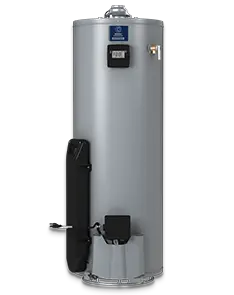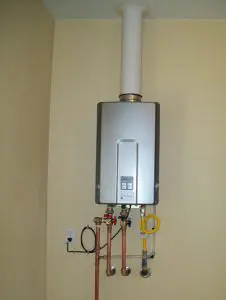Water Heaters
When selecting the best type and model of water heater, consider the following:
Size: To provide your household with enough hot water and to maximize efficiency, you need a properly size water heater.
Energy Efficiency: To maximize your energy and cost savings, you want to know how energy efficient a water heater is before you purchase it.
Costs: Before you purchase a water heater, it’s also a good idea to estimate its annual operating costs and compare those costs with other less or more energy-efficient models.

Water Heater Options
Conventional Storage Water Heaters
Conventional storage water heaters remain the most popular type of water heating system for the home. Here you’ll find basic information about how storage water heaters work; what criteria to use when selecting the right model; and some installation, maintenance and safety tips.
How they work? A single-family storage heater offers a ready reservoir – from 20 to 80 gallons – of hot water. It operates by releasing hot water from the top of the tank when you turn on the hot water tap. To replace that hot water, cold water enters the bottom of the tank, ensuring the tank is always full. Propane Gas Storage Water HeaterSince water is constantly heating in the tank, energy can be wasted even when a hot water tap isn’t running. This is called standby heat loss. Only tankless water heaters – such as demand-type water heaters – avoid standby heat losses.
Some storage water heater models have heavily insulated tanks, which significantly reduce standby heat losses and lower annual operating costs. Look for models with tanks that have a thermal resistance (R-Value) of R-12 to R-25. Gas and oil water heaters also have venting-related energy losses. Two types of water heaters – a fan-assisted gas water heater and an atmospheric sealed-combustion water heater – reduce these loses.
Installation and Maintenance: Proper installation and maintenance of your water heater can optimize its energy efficiency. Proper installation depends on many factors. These factors include fuel type, climate, local building code requirements, and safety issues. It’s best to have a qualified plumbing and heating contractor install your storage water heater. Periodic water heater maintenance can significantly extend your water heater’s life and minimize loss of efficiency.
Improving Energy Efficiency: After your water heater is properly installed and maintained, try some additional energy-saving strategies to help lower your water heating bills.

Tankless or Demand-Type Water Heaters
Tankless Propane Water Heater Tankless water heaters, also known as demand-type or instantaneous water heaters, provide hot water only as it is needed. They do not produce the standby energy losses associated with storage water heaters, which can save you money. Here you’ll find basic information about how they work, whether a tankless water heater might be right for your home, and if a tankless water heater is right for you.
How they work? Tankless water heaters heat water directly without the use of a storage tank. When a hot water tap is turned on, cold water travels through a pipe into the unit. Either a gas burner or an electric element heats the water. As a result, tankless water heaters deliver a constant supply of hot water. You don’t need to wait for a storage tank to fill up with enough hot water. However, a tankless water heater’s output limits the flow rate.
Typically, tankless water heaters provide hot water at a rate of 2 – 5 gallons (7.6 – 15.2 liters) per minute. Gas-fired tankless water heaters product higher flow rates than electric ones. Sometimes, however, even the largest, gas-fired model cannot supply enough hot water for simultaneous, multiple uses in large households.
Advantages and Disadvantages: The initial cost of a tankless water heater is greater than that of a conventional storage water heater, but tankless water heaters will typically last longer and have lower operating and energy costs, which could offset its higher purchase price. Most tankless water heaters have a life expectancy of more than 20 years. They also have easily replaceable parts that extend their life by many more years. In contact, storage water systems last 10 – 15 years.
Tankless water heaters can avoid the standby heat losses associated with storage water heaters. However, although gas-fired tankless water heaters then to have higher flow rates than electric ones, they can waste energy if they have a constantly burning pilot light. This can something offset the elimination of standby energy losses when compared to a storage water heater. In a gas-fired storage water heater, the pilot light heats the water in the tank so the energy isn’t wasted. The cost of operating a pilot light in a tankless water heater varies from model to model. If you purchase a model that uses a standing pilot light, you can always turn it off when it’s not in use to save energy.
Also consider models that have an intermittent ignition device (IID) instead of a standing pilot light. This device resembles the spark ignition device on some gas kitchen ranges and ovens.
Installation and Maintenance: Proper installation and maintenance of your demand water heater can optimize its energy efficiency. Proper installation depends on many factors. These factors include fuel type, climate, local building code requirements and safety issues. It’s best to have a qualified plumbing and heating contractor install your demand water heater. Periodic water heater maintenance can significantly extend your water heater’s life and minimize loss of efficiency.
Improving Energy Efficiency: After your demand water heater is properly installed and maintained, try some additional energy-saving strategies to help lower your water heating bills. Some energy-saving devices are systems are more cost-effective to install with the water heater.
Storage Water Heaters vs. Tankless Water Heaters
Choosing the best water heater for your home has become more challenging in recent years as new designs have swept the industry and rising energy costs have raised consumers’ eyebrows. In spite of the promise of the high-tech water heaters of the future, most folks in need of a water heater today still find themselves facing the same decision: tank of tankless?
Unfortunately for consumers, their choice is not easy to make. Costs and efficencies vary widely, and the least-expensive water heater might be the one that puts the biggest drain on your savings account over time, making an even more important decision. We provided some resources below to assist in your decision of tank vs. tankless water heaters.
Call the professionals at CES to help make that decision @ 800-874-1975. But an education consumer is the best consumer… Do your homework!!
Resources:
- Water Heaters: Tank or Tankless?
- Pros and Cons: Tankless Water Heaters vs. Hot Water Tanks
- Are you ready for a Tankless water heater?
- Traditional Water Heaters vs. Tankless Water Heaters Which One is Better
- Tankless Heater, Their Limitations and Interesting Alternatives
- Tank vs. Tankless Have the new tankless water heaters improved?
- New Efficiency Standards Heat Up Tanks vs. Tankless Water Heater Debate
- Tankless vs Tank Water Heaters – Major Decisions Afoot


